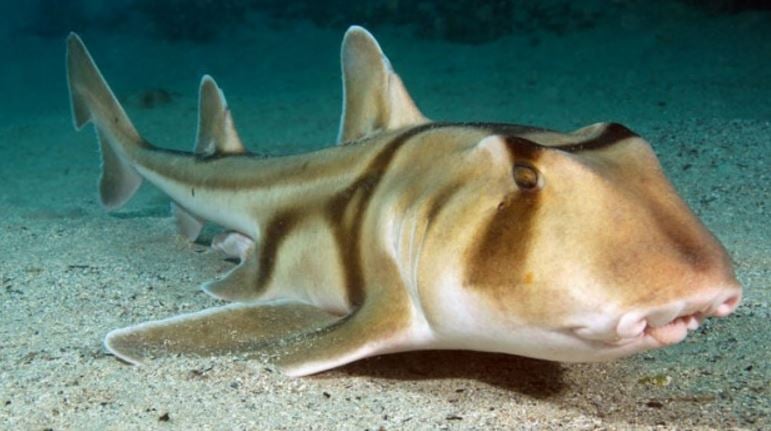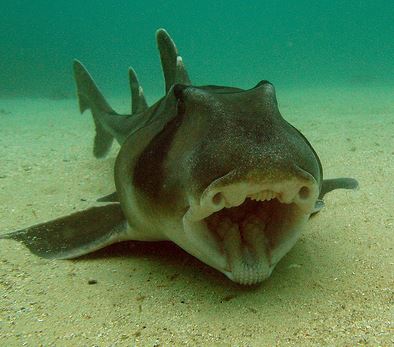Sharks will be significantly smaller and lousy hunters by the end of this century because of higher carbon dioxide levels and warmer oceans, a team of scientists from the University of Adelaide has warned.
The marine ecologists reported in the journal Scientific Reports that their long-term experiments demonstrated that warmer water and ocean acidification will have a devastating effect on sharks’ ability to meet their energy requirements.
These detrimental effects, they added, will probably have a domino-effect through entire ecosystems.
 The Port Jackson shark relies on its sense of smell to find food. How will it cope when CO2 levels continue rising and it cannot smell the food?
The Port Jackson shark relies on its sense of smell to find food. How will it cope when CO2 levels continue rising and it cannot smell the food?
The researchers conducted laboratory experiments on Port Jackson sharks at the University of Adelaide’s Environment Institute. While studying the animals in large tanks with natural habitat and prey, they observed that under elevated temperatures their embryonic development was faster.
Higher CO2 levels bad for shark’s sense of smell
However, the combination of higher carbon dioxide (CO2) levels and warmer water raised the sharks’ energy requirement, reduced their metabolic efficiency, and left them unable to locate food through olfaction (by using their sense of smell).
These effects resulted in considerable reductions in the sharks’ growth rates.
Study leader, Associate Professor Ivan Nagelkerken, Australian Research Council (ARC) Future Fellow, said:
“In warmer water, sharks are hungrier but with increased CO2 they won’t be able to find their food. With a reduced ability to hunt, sharks will no longer be able to exert the same top-down control over the marine food webs, which is essential for maintaining healthy ocean ecosystems.”
Jennifer Pistevos, a PhD student, who carried out the study, explained that Port Jackson is a bottom-feeding shark that relies primarily on olfaction to find food.
Sharks were smaller in higher CO2 environments
When in an environment with higher CO2 levels, they took much longer to find their food. In many cases they did not even bother trying, resulting in significantly smaller animals.
The majority of studies that looked at the effects of ocean acidification and climate change on fish behavior focused on smaller fish prey. There are very few studies on what might happen to the behavior and physiology of large, long-lived predators, the authors pointed out.
Marine biologist, Professor Sean Connell, says the study findings provide strong support for the call to stop global overfishing of sharks.
Prof. Connel says:
“One-third of shark and ray species are already threatened worldwide because of overfishing. Climate change and ocean acidification are going to add another layer of stress and accelerate those extinction rates.”
In journal’s Abstract the authors wrote:
“The combination of these effects led to considerable reductions in growth rates of sharks held in natural mesocosms with elevated CO2, either alone or in combination with higher temperature. Our results suggest a more complex reality for predators, where ocean acidification reduces their ability to effectively hunt and exert strong top-down control over food webs.”
Citation: “Ocean acidification and global warming impair shark hunting behaviour and growth,” Jennifer C. A. Pistevos, Ivan Nagelkerken, Tullio Rossi, Maxime Olmos & Sean D. Connell. Scientific Reports. 12 November, 2015. DOI: 10.1038/srep16293.

